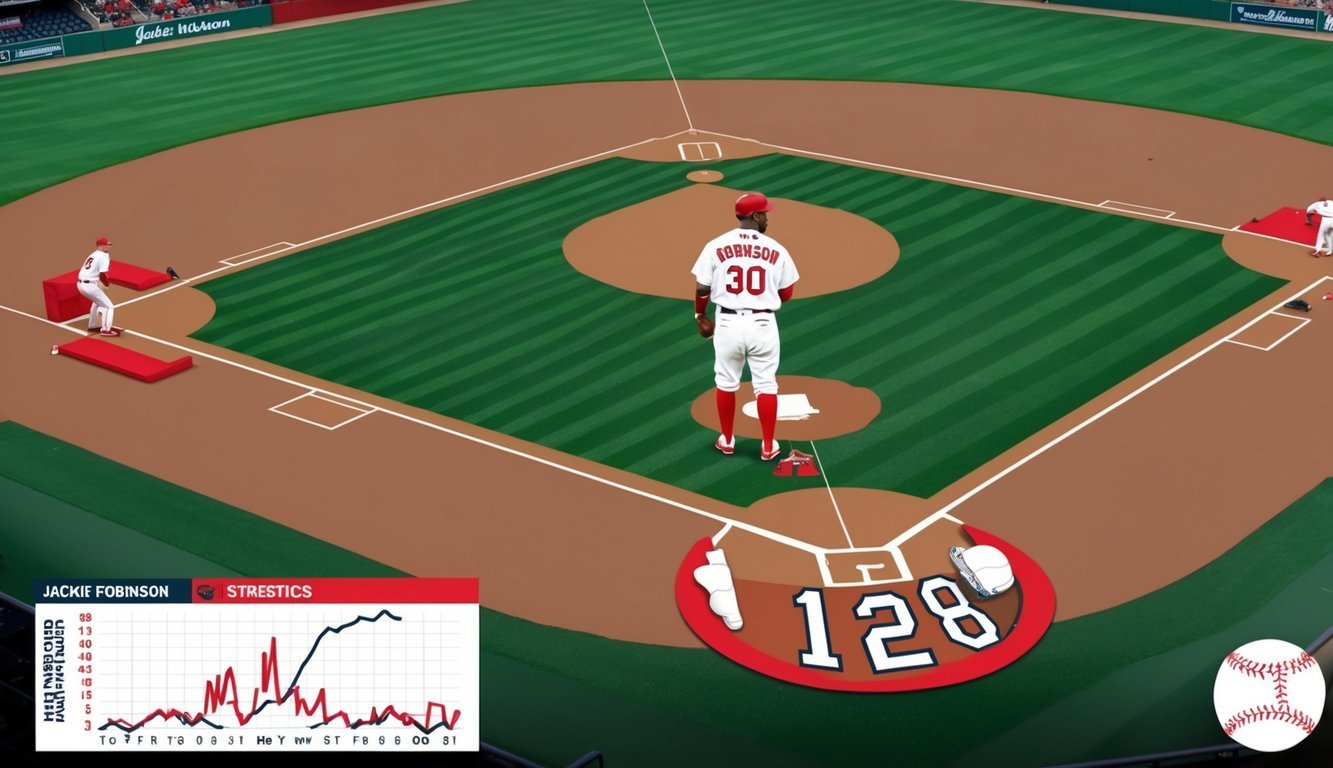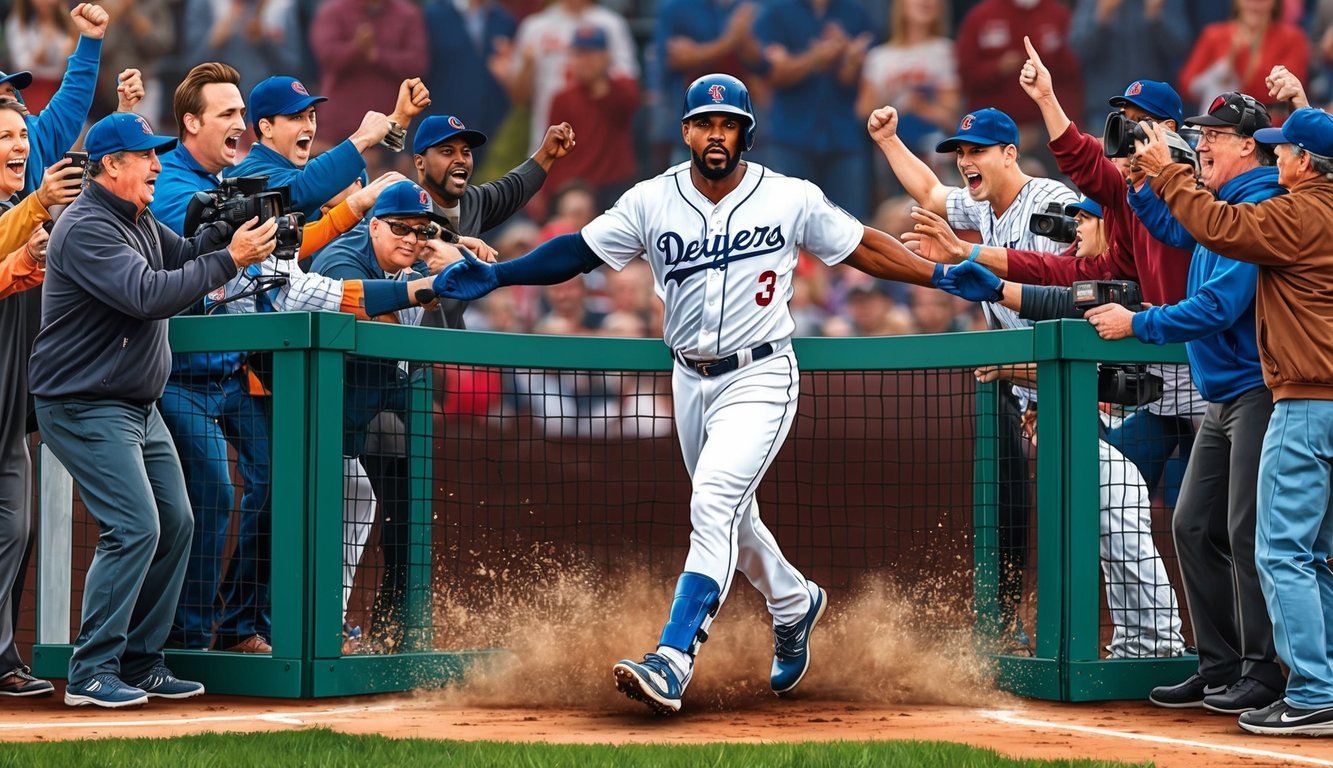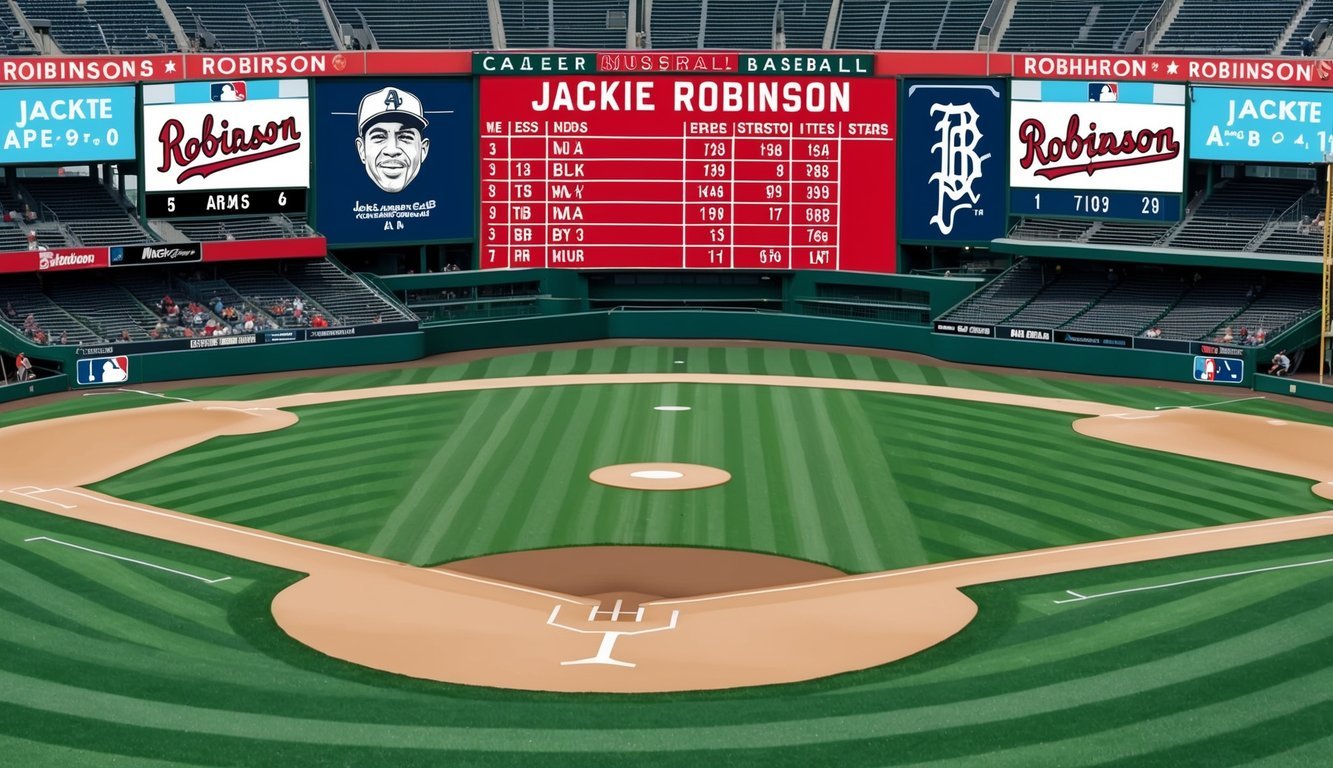Jackie Robinson‘s baseball statistics tell a remarkable story of talent, perseverance, and groundbreaking achievement.
As the first African American to play in Major League Baseball in the modern era, Robinson’s impact extended far beyond the numbers on a scoresheet.
Over his 10-year career with the Brooklyn Dodgers from 1947 to 1956, Robinson compiled an impressive .311 batting average, 1,518 hits, 137 home runs, and 734 RBIs. His speed and baserunning skills were equally notable, as he stole 197 bases and scored 947 runs during his time in the majors.
Robinson’s exceptional performance earned him the inaugural Rookie of the Year award in 1947, the National League MVP in 1949, and six All-Star selections.
Robinson’s statistics reflect not only his individual success but also his pivotal role in changing the face of baseball.
His .409 on-base percentage and 740 walks demonstrate his disciplined approach at the plate, while his versatility in the field allowed him to excel at multiple positions, including second base, third base, and first base.
These numbers paint a picture of a complete player who left an indelible mark on America’s pastime.
Early Years and Entry into Major League Baseball
Jackie Robinson was born on January 31, 1919, in Cairo, Georgia.
He grew up in Pasadena, California, where he excelled in various sports during his youth.
Robinson attended UCLA, becoming the first athlete to letter in four sports: baseball, basketball, football, and track.
His athletic prowess caught the attention of many, but professional opportunities were limited due to racial barriers.
In 1945, Robinson joined the Kansas City Monarchs in the Negro Leagues.
His talent didn’t go unnoticed, and Brooklyn Dodgers executive Branch Rickey soon signed him to the organization.
Robinson made history on April 15, 1947, when he debuted for the Brooklyn Dodgers.
This momentous occasion broke the color barrier in Major League Baseball, paving the way for integration in America’s pastime.
Wearing number 42, Robinson faced immense pressure and racial discrimination.
Despite the challenges, he displayed remarkable skill and composure on the field.
His first season was a resounding success.
Robinson batted .297, led the National League in stolen bases, and earned the inaugural Rookie of the Year award.
Robinson’s entry into MLB wasn’t just about baseball – it was a pivotal moment in the civil rights movement.
His courage and talent inspired generations of players and fans alike.
Career Highlights and Awards
Jackie Robinson’s baseball career was filled with remarkable achievements.
He won the National League Most Valuable Player (MVP) award in 1949, batting an impressive .342 with 124 RBIs and 37 stolen bases.
Robinson was selected for six consecutive All-Star teams from 1949 to 1954.
His consistent performance at the plate and on the field made him a fan favorite and a respected player among his peers.
In 1955, Robinson helped lead the Brooklyn Dodgers to their first World Series championship.
He famously stole home in Game 1, showcasing his daring baserunning skills on baseball’s biggest stage.
Robinson maintained a stellar .311 career batting average over his 10 seasons in Major League Baseball.
He accumulated 1,518 hits, 137 home runs, and 734 RBIs during his time with the Dodgers.
His groundbreaking rookie season in 1947 earned him the inaugural Rookie of the Year award.
This honor now bears his name as the Jackie Robinson Rookie of the Year Award.
Robinson’s impact on baseball extended beyond his playing days.
He was inducted into the Baseball Hall of Fame in 1962, becoming the first African American player to receive this prestigious recognition.
Statistical Overview

Jackie Robinson’s MLB career was marked by impressive numbers across multiple facets of the game.
His statistical achievements showcased his exceptional abilities as both a hitter and fielder during his 10 seasons with the Brooklyn Dodgers.
Batting Performance
Robinson maintained a stellar . 311 batting average over his career.
He accumulated 1,518 hits, including 137 home runs and 734 RBIs.
His on-base percentage was an impressive . 409, while his slugging percentage stood at . 474.
These numbers combined for a remarkable . 883 OPS.
Robinson’s exceptional performance on the field not only solidified his legacy as one of baseball’s greats but also sparked discussions about player valuations in the sport.
Today, as fans analyze the financial impact of top players, many turn to statistics and metrics to assess current stars, leading to intriguing topics such as ‘aaron judge net worth analysis. ‘ His ability to command attention both in terms of gameplay and financial worth illustrates the evolving landscape of baseball economics.
Robinson’s best season at the plate came in 1949.
That year, he hit .342 with 16 home runs, 124 RBIs, and led the league with 37 stolen bases.
This outstanding performance earned him the National League MVP award.
Fielding and Baserunning
Robinson’s versatility shone through in his fielding stats.
He primarily played second base but also saw time at third base and first base.
His quick reflexes and athleticism contributed to his solid defensive numbers.
On the basepaths, Robinson was a constant threat.
He stole 197 bases during his career, including a league-leading 37 in 1949.
His baserunning prowess added significant value to his overall game.
Robinson’s all-around skills are reflected in his career Wins Above Replacement (WAR) of 61.7, an impressive figure that underscores his impact on the field.
Impact on Baseball and Society

Jackie Robinson’s debut with the Brooklyn Dodgers in 1947 forever changed baseball and American society.
As the first African American to play in Major League Baseball in the modern era, he broke the color barrier that had long segregated the sport.
Robinson’s presence in the National League opened doors for other talented Black players.
Within a few years, stars like Willie Mays and Hank Aaron joined the ranks of MLB, enriching the game with their incredible skills.
His courage in the face of racial abuse inspired many during the Civil Rights Movement.
Robinson became a symbol of progress and equality, using his platform to advocate for civil rights both on and off the field.
On the diamond, Robinson’s electrifying style of play helped revolutionize the game.
His speed, baserunning aggression, and versatility brought a new dynamic to baseball strategy.
Robinson’s impact extended beyond sports.
His success challenged racial stereotypes and discrimination in broader society, paving the way for integration in other areas of American life.
MLB continues to honor Robinson’s legacy.
Every April 15th, all players wear his number 42, which has been retired league-wide.
This annual celebration serves as a reminder of Robinson’s enduring influence on baseball and American culture.
Legacy and Post-Career Achievements

Jackie Robinson’s impact on baseball and society extended far beyond his playing days.
After retiring, he continued to break barriers and advocate for civil rights.
In 1962, the Baseball Hall of Fame inducted Robinson.
He became the first African American to receive this honor.
His plaque in Cooperstown celebrates both his athletic prowess and his role as a trailblazer.
In 1997, Major League Baseball retired Robinson’s uniform number 42 across all teams.
This unprecedented move ensures his legacy is visible on every field, every game.
The annual Jackie Robinson Day, celebrated on April 15, sees all MLB players wear number 42 in his honor.
It’s a powerful reminder of his enduring influence on the sport.
Robinson received several prestigious awards, including:
- Six-time All-Star (1949-1954)
- National League MVP (1947)
- Rookie of the Year (1947)
His .311 career batting average stands as a testament to his skill on the diamond.
Robinson’s legacy lives on through films, books, and educational programs that continue to inspire new generations.
The Jackie Robinson Foundation, established by his wife Rachel, provides scholarships and leadership development opportunities for minority youth.
It’s another way his impact continues to grow, decades after his final at-bat.
